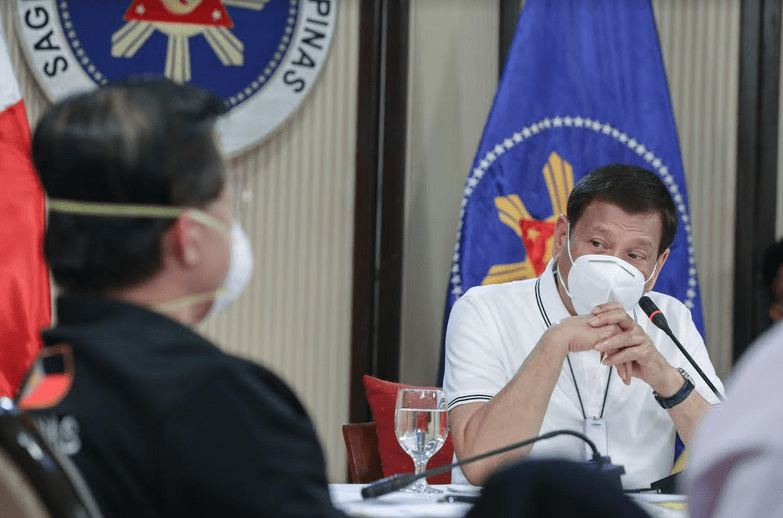
President Rodrigo Duterte holds a meeting with members of the Inter-Agency Task Force for Emerging Infectious Diseases (IATF-EID) at the Malago Clubhouse in Malacañang on April 23, 2020. TOTO LOZANO / PRESIDENTIAL PHOTOS
The government task force in-charge of the Covid-19 response has recommended an extension of the prevailing “enhanced community quarantine” (ECQ) in Metro Manila, Central Luzon, Calabarzon and other “high-risk” areas until May 15.
Palace spokesman Harry Roque read the recommendations of the Inter-Agency Task Force for Emerging Infectious Diseases in a meeting with President Rodrigo Duterte on Thursday, April 23.
In a statement, the task force said the recommendations were “based on the risk of outbreak.”
Roque, however, said the final list might still change by April 30, and areas under ECQ would be evaluated to determine whether restrictions would be lifted by May 16, 2020.
In Central Luzon or Region 3, high-risk provinces include include Bataan, Bulacan, Nueva Ecija, Pampanga, Tarlac and Zambales.
In Calabarzon or Region 4-A, Batangas, Cavite, Laguna, Rizal and Quezon.
In Mimaropa or Region 4-B, Oriental Mindoro and Occidental Mindoro.
In the Bicol Region or Region 5, Albay and Catanduanes.
In the Ilocos Region or Region 1, Pangasinan.
In the Cordillera Autonomous Region, Benguet.
In the Visayas, Antique, Iloilo, Cebu and Cebu City, Aklan and Capiz.
In Mindanao, Davao del Norte and Davao City, as well as Davao de Oro.
Moderate-risk areas meanwhile will be under “general community quarantine” until May 15. Low-risk areas will fall under general community quarantine until May 15, but restrictions will be relaxed “if there is no deterioration” in the situation.
The task force also recommended the implementation of a “minimum health standard” by April 27. Guidelines will be prepared by the Department of Health, the Department of Transportation, the Department of Trade and Industry, the Department of Labor and Employment and the Department of Public Works and Highways by April 25.
Roque said areas previously under GCQ would allow workers to go out and work in phases. Young people, senior citizens and people with high health risk would be required to stay at home.
The task force recommended that in GCQ areas, non-leisure shops in malls would be reopened, with mandatory temperature checks, wearing of masks, and alcohol use. Only a limited number of people, particularly ages 21 to 59, with IDs and “not looking sickly,” will be allowed inside.
Priority and essential construction projects will resume, subject to minimum health standards, physical distancing, and the provision of barracks for workers.
Public transport will also be allowed to operate at reduced capacity, and local government units (LGUs) will enforce a night curfew for non-workers. (PressONE.ph)